As TV channels flashed footage of mountains of cash being recovered from the home of a politician’s aide, concerns arise about how far justice will be served. Will the enforcement of justice be swayed by political influence? In the current case almost Rs 49 crore has been recovered from the Kolkata home of actress and model Arpita Mukherjee, closely linked to West Bengal minister Partha Chatterjee, who in turn is said to be a confidante of Chief Minister and Trinamool Congress supremo Mamata Banerjee. [caption id=“attachment_10954901” align=“alignnone” width=“640”]  Money recovered from the flat of Arpita Mukherjee, Bengal minister Partha Chatterjee’s aide, during the ED raids on Friday. Twitter/@dir_ed[/caption] Partha Chatterjee is yet another manifestation in a long list of Indian politicians who have been accused of corruption, charged, convicted, and sometimes incarcerated. Political alignments here are definitely not in sync with the ruling party at the Centre and yet the chances of the legal outcome being determined by political power cannot be ruled out. It doesn’t help that all legal recourse in India has its own tedious timelines. Legal eagles have also complained of loopholes being exploited with impunity. In 2013, the Supreme Court ruled convicted officials would be barred for six years. But few cases ever get that far. According to data submitted by the Centre to the Supreme Court till 2018, a mere six per cent of criminal cases against India’s MPs and MLAs ended in conviction. Of 3,884 such cases — conviction for which results in a six-year ban from contesting elections — guilty judgements were pronounced in 38 and 560 were acquitted. India ranks 79 out of 139 countries and jurisdictions in the World Justice Project’s (WJP) Rule of Law Index 2021. The index being an indicator of which country is the strongest adherence to the rule of law. What has India done to assure its citizens that politicians are meant to serve the people and not loot the state? How are the processes of law currently coping with this malaise? What were the legal problems in the past and do those infuriating cobwebs still blur our vision? In India and elsewhere, several stakeholders in the legal framework depend directly on the ruling regime. This makes them more susceptible to political pressures. Politicians from the governing party can potentially change the career trajectory of those in charge of the investigation. Most of the times when the police are investigating any crime involving corruption by politicians, there is invariably a deliberate delay or slowdown. The system works equally well for the persons from the ruling party as also the Opposition, due to the unsaid rule of quid pro quo. Every ruling party would be in the Opposition some day and vice versa. The tug of coalition politics has made it worse. Tagged as the world’s largest democracy, India is also the world’s second-fastest growing economy after China. But its image has taken a constant beating as the long and winding road of India’s development has been scarred with craters called “corruption”. Political parties are perceived to be the most corrupt institution by Indians, according to the 2009 Global Corruption Barometer. The Barometer, a global public opinion survey, released by Transparency International, found that 58 per cent of Indian respondents identified politicians to be single most corrupt individuals. Senior lawyer Srinivas Kotni told Firstpost, “There are a multitude of reasons for delayed investigation and thereafter delayed litigation, important among them being the high density of our population and resultant magnitude of crimes and heavy litigation clogging the courts and also due to the adversarial legal system which makes any investigation/ trial a lengthy affair. The concepts of rule of law and the need for adherence to principles of natural justice are also factors responsible for delays in general.” It seems to be common knowledge that courts are more inclined to grant bail in cases involving politicians due to their networking and pockets of influence within the judiciary. Although the list is long, here are some of the high-profile cases of corruption involving top Indian politicians. Former Tamil Nadu chief minister J Jayalalithaa was found guilty of corruption in September 2014 and was jailed for four years by a special court in Bengaluru. The actor-turned-politician was the first serving chief minister to lose her post and be sent to jail. However, on 11 May 2015, she was acquitted of all charges by the Karnataka high court. [caption id=“attachment_10980081” align=“alignnone” width=“640”]  Gold ornaments found at Jayalalithaa’s residence in 1997. Image courtesy: english.tupaki.com[/caption] A Raja, the DMK leader and ex-telecom minister, spent 15 months in jail starting 2 February 2011 during the trial of the 2G scam after the CBI charged him and 16 others with cheating and criminal conspiracy to abuse public office. On 12 May 2012, Raja got bail from the trial court and was among the last to be let out. On 21 December 2017, a special CBI court acquitted all accused in the case. [caption id=“attachment_10980101” align=“alignnone” width=“640”] 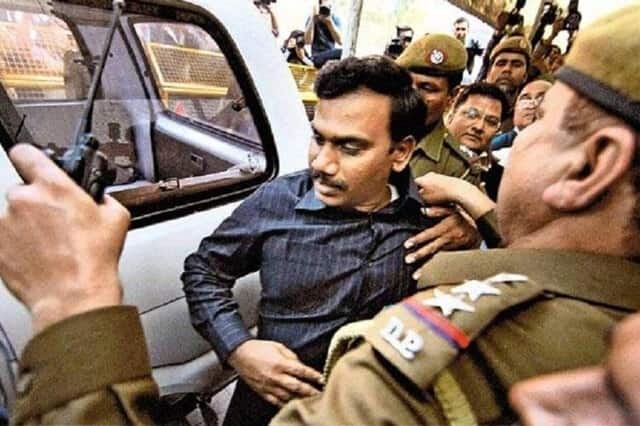 A Raja: Former Telecom Minister and a Dravida Munnetra Kazhagam (DMK) leader Andimuthu Raja, popularly known as A Raja, was sent to Tihar jail following his arrest in the 2G Spectrum Case. He was perhaps the most high-profile Tihar inmate and was acquitted in 2017. (Image: PTI)[/caption] Suresh Kalmadi, the former Congress parliamentarian, who was the chairman of the organising committee for the controversial 2010 Commonwealth Games, was charged by the Enforcement Directorate along with nine others with criminal conspiracy, forgery, cheating and other offences. He was arrested on 25 April 2011 and was released on bail nine months later. [caption id=“attachment_10980131” align=“alignnone” width=“640”] 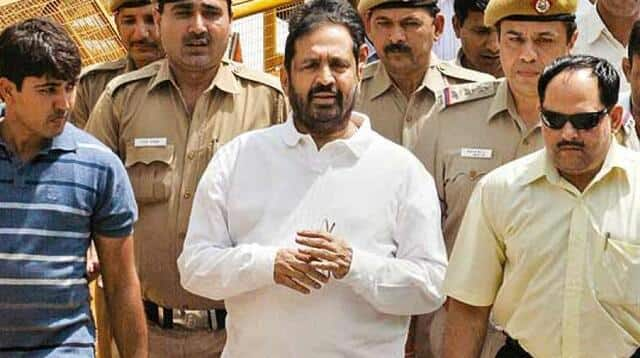 Suresh Kalmadi was charged by the Enforcement Directorate along with nine others with criminal conspiracy, forgery, cheating and other offences. AP[/caption] The Bihar fodder scam has several cases, in which Lalu Prasad Yadav, former Bihar Chief Minister, is an accused in 6 cases. Lalu Prasad has been convicted and jailed in two cases. [caption id=“attachment_10980161” align=“alignnone” width=“640”] 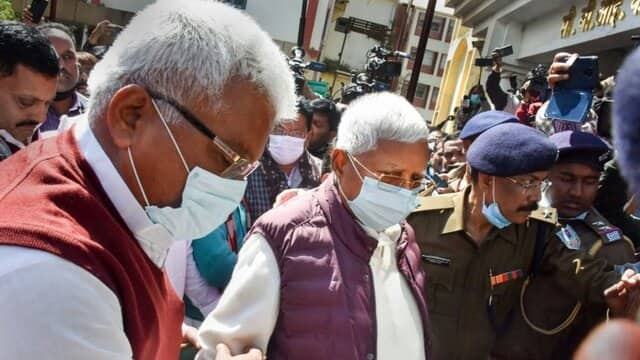 Rashtriya Janta Dal chief Lalu Prasad Yadav at special CBI court in connection with the fodder scam, in Ranchi, 15 February, 2022. PTI[/caption] Sukh Ram (now deceased) was the telecom minister in PV Narasimha Rao’s cabinet. In 1996, Rs 3.6 crore were seized by the CBI from his official residence. Despite being convicted in two separate corruption cases in 2002 and 2009 he remained out of jail. [caption id=“attachment_10980271” align=“alignnone” width=“640”] 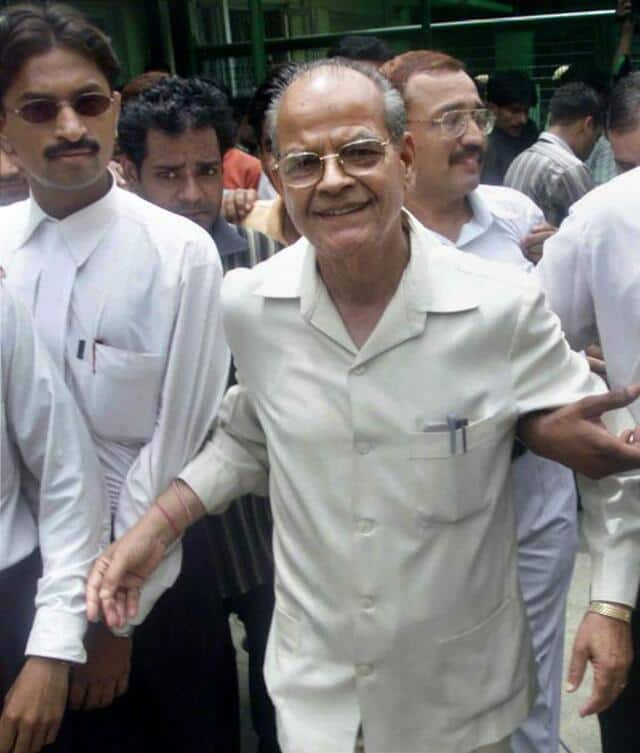 File image of former telecom minister Sukh Ram coming out of court after he was sentenced to three years RI in a telecom case on 5 July, 2002. PTI[/caption] Madhu Koda was the chief minister of Jharkhand from 2006 to 2008 (UPA alliance). Reportedly, Koda and his associates collected over Rs 4,000 crore in the iron ore and coal mining scam, investigative agencies alleged. On 30 November 2009, he was arrested by the Jharkhand Police’s vigilance wing and on 31 July 2013, he was released on bail. Later, a special money-laundering court in Delhi attached Koda’s properties worth Rs 144 crore. In December 2017, Madhu Koda was convicted and given a three-year jail term and imposed a fine of Rs 25 lakh. [caption id=“attachment_10980351” align=“alignnone” width=“640”] 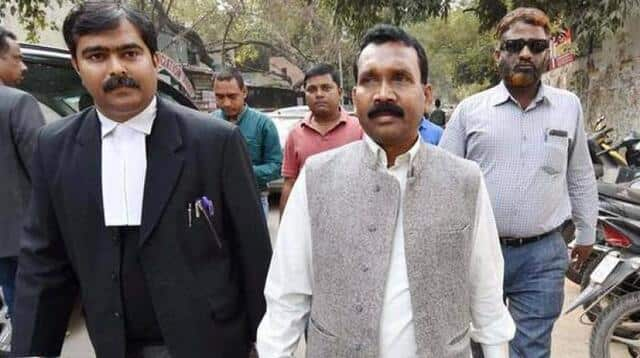 Former Jharkhand chief minister Madhu Koda and ex-coal secretary H C Gupta sentenced to three years imprisonment by a special court in New Delhi in a case of coal block allocation scam on December. 2017. PTI[/caption] Mayawati could have become a symbol of women empowerment, but instead attained notoriety for cases of alleged corruption against her. In 2002, after finding financial irregularities in the Taj Heritage Corridor Project, she had to resign from the post of the chief minister of Uttar Pradesh. However, in June 2007, the case was ended on grounds of insufficient evidence. On 13 March 2012, she declared assets worth Rs 111.26 crore. On 6 July 2012, a Supreme Court bench quashed the disproportionate assets case against Mayawati; citing that the court found that the case was unwarranted. [caption id=“attachment_10980381” align=“alignnone” width=“640”] 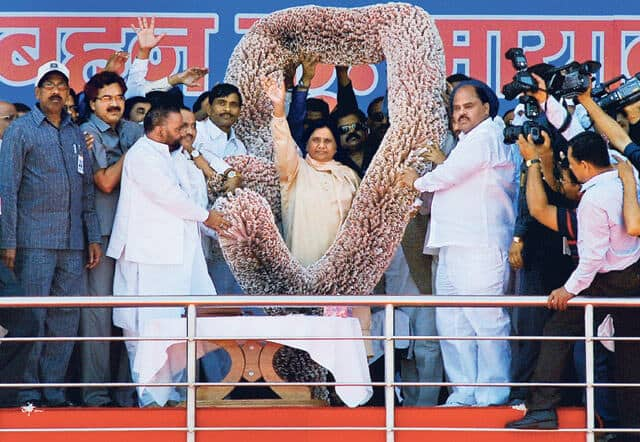 Bahujan Samaj Party (BSP) leader Mayawati (centre) is presented a garland of currency notes at a party rally in Lucknow 2010. AFP File[/caption] When BS Yediyurappa became the 25th Chief Minister of Karnataka, it was a first for the BJP in a south Indian state. On 15 October 2011, he was arrested for illegally denotifying land in and around Bangalore. After spending 23 days in jail, he was granted bail. However, the High Court of Karnataka quashed the FIR registered against him regarding the mining in March 2012. [caption id=“attachment_10980401” align=“alignnone” width=“640”] 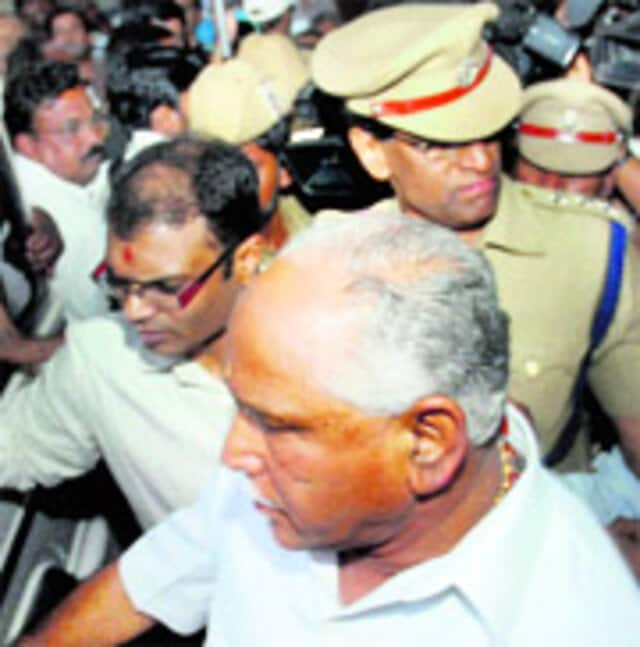 BS Yeddyurappa being arrested in Bangalore On 15 October 2011. PTI File[/caption] Many questions arise on whether our laws lack bite. Lawyer Srinivas Kotni went on to add: “In my view there should be a law specially making it mandatory to have a summary investigation and trial in respect of those who are accused of public corruption, (whether by politicians, bureaucrats or otherwise). This will make the system work faster such that the cases involving corruption are taken to their logical end.” Laws in India are more than adequate but remember we are the only country in the world where judges appoint judges. To top it, legal recriminations do not end political careers in India. In some cases, they convert obscurity into notoriety. The author is CEO of nnis, Views expressed are personal. Read all the Latest News , Trending News , Cricket News , Bollywood News , India News and Entertainment News here. Follow us on Facebook, Twitter and Instagram.
What has India done to assure its citizens that politicians are meant to serve the people and not loot the state? How are the processes of law currently coping with this malaise?
Advertisement
End of Article


)

)
)
)
)
)
)
)
)



